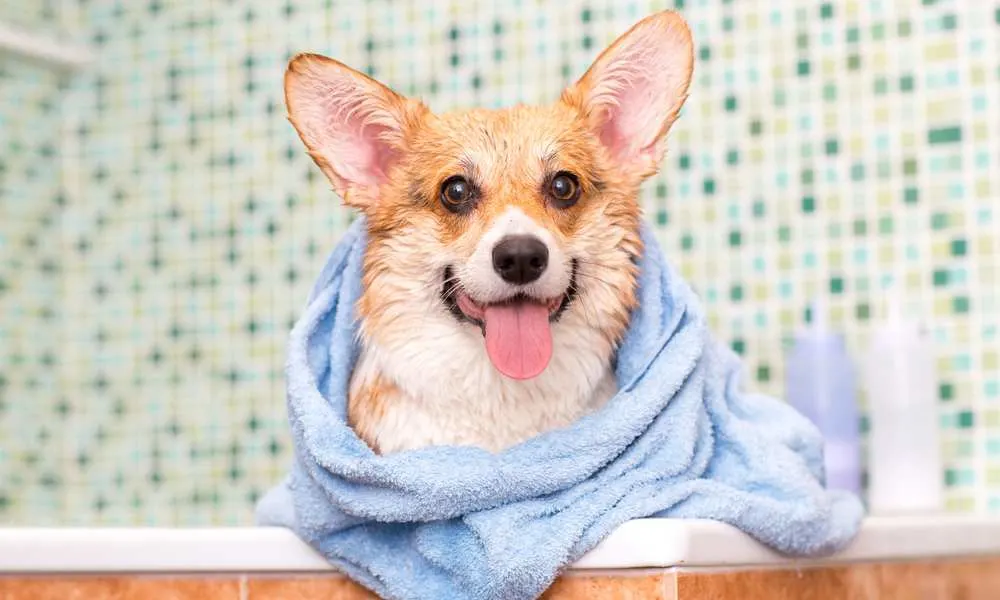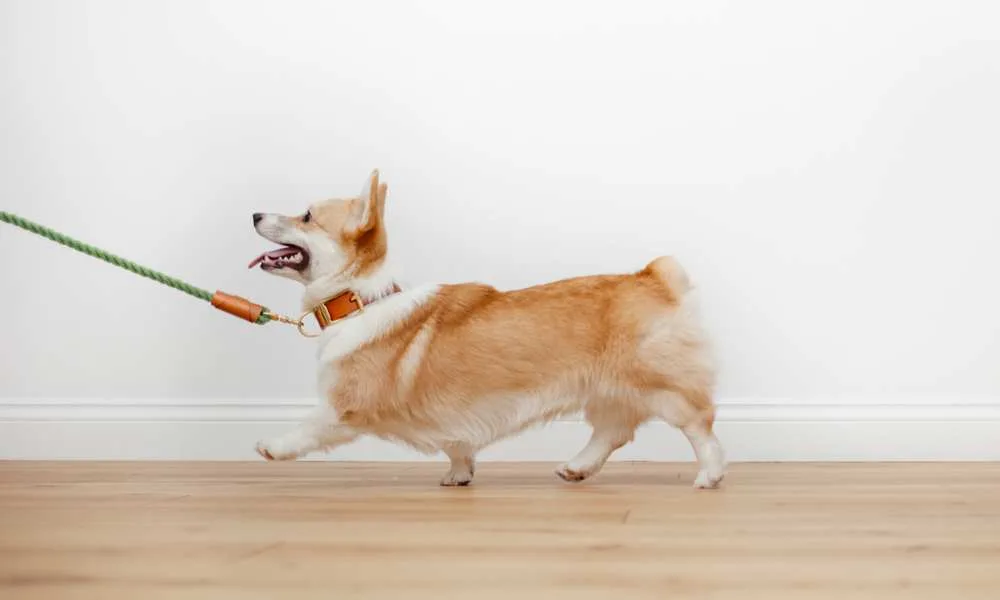Your corgi is in danger of fleas and you don’t know how to get rid of them? Scroll through this article for instantly effective methods against this animal-enemy.
Naturally, one of the most common but also the biggest concerns of any dog owner is whether fleas had attacked it and how to get rid of them. Thankfully, today there are numerous effective flea treatments that are harmless and can give you instant results. The only trouble is deciding on the best flea treatment for corgis in this case.
Continue reading and find out more about what flea treatment best suits your corgi!

Best Flea Treatment For Corgis: Top Flea-Free Choices
Today, veterinary medicine has reached a huge development in all areas of dog care. One of the biggest concerns – fleas in dogs – has become easy to solve with the help of many effective treatments.
According to research, these are the top options in the fight against fleas in corgis.
| CATEGORY | NAME | USEFULNESS |
|---|---|---|
| Overall | NextGard Soft Chew For Dogs | The main ingredient, which is afoxolaner – destroys the fleas before they have a chance to lay eggs. |
| Oral | Bravecto Chews For Dogs | This is an excellent option for dogs with thick coats (corgis). |
| Collar | Seresto 8 Month Flea & Tick Prevention Collar for Large Dogs | This convenient flea preventative dog collar can last up to 8 months. |
| Shampoo | Adams Plus Flea & Tick Shampoo | This shampoo will have your dog cleaned from fleas after just a couple of baths. |
| Natural | Vet’s Best Flea & Tick Pet & Home Spray | Natural sprays are one of the most effective flea treatments currently. |

Chewable Medicine
One of the newest approaches in flea removal is chews and pills. A significant number of owners claim that this type of “medicine” provides the most evident and fastest results. But how does it work?
Flea chews and pills are chewable medications aimed at treating a flea-infected dog from the inside. There are different types of pills and chews, and each of them contains other ingredients.
The thing is – you must go to your vet to start using this medication method—a prescription is obligatory. You won’t be able to get (checked) flea pills without a vet’s instruction.
Dog flea pills remain in your dog’s organism for a couple of days, after which he naturally gets rid of them. However, these pills don’t work for everyone the same.
Breeds who are currently on a strict diet or have a medical history that prevents them from including strong substances in their daily meals should refrain from pills.
Of course, this all depends on the examination by a veterinarian.
If your dog has no eating disorder but has a problem with fleas, you should try giving him dog flea chews – these are like ordinary treats that it can munch on after a regular meal.
Why are they good?
Well, for one, dog flea chews can protect your dog from fleas for up to 4 months. They can be given to both adult dogs and puppies (8 weeks).
Their most significant advantage might be that professionals are continually working on their improvement and new tastes.

Stick To Natural Products?
Natural flea removal in dogs brings many options, most of which have proven successful. These remedies can be classified into the following groups:
- Liquid treatments (sprays, dips, rubs)
- Natural collars
- Combs
- Nourishment
LIQUID TREATMENTS
| Apple cider and salt spray | Take six cups of apple cider, four cups of water, and a dash of salt. Dilute this mixture and watch it do wonders to your dog’s optimal health and flea removal. Spray it directly on the coat. |
| Quick lemon bath | All you have to do is squeeze two fresh lemons, add this amount to your dog’s original shampoo and rinse well. |
| Rosemary | Rosemary dip might look innocent, but it’s actually very beneficial. Dip rosemary leaves in boiled water and then pour in on your dog’s coat and let it dry naturally. |
| Neem-oils | Although it’s not famous, neem-oils are one of the oldest flea repellents. These natural oils can be added alone or as an additive to shampoo. |
| Organic soap | Organic soaps containing either peppermint or rose petals can serve as an effective flea remover for dogs with sensitive skins and coats. |
| Coconut oil | Coconut oil has many purposes, and it can function as a flea repellent. Rubbing one teaspoon of this oil can significantly reduce the number of fleas and make your corgi’s coat shiny. |
| Aromatherapy | Almond oil, combined with lemon eucalyptus, makes great aromatherapy that protects your dog from fleas and acts as a natural soother. |
NATURE’S COLLARS
| Lavender or cedar oil | You can either buy this or make it by yourself. After you get your hands on this, apply it directly to the collar or bandana. |
| Vodka | Apply a small teaspoon of vodka on your dog’s collar and rub it. This strong substance will quickly destroy the fleas. |
NATURAL FLEA COMBS
| Lemon comb | All you have to do is dip your dog’s regular comb into lemon juice and comb his coat. Leave it to stay, and make sure to bathe him and rinse. |
| Flea comb | Flea combs don’t necessarily contain strong chemical substances that can damage your dog’s coat. They are made according to a specific breed. |
NOURISHMENT
| Vinegar or apple cider | You can do this by pouring some vinegar or apple cider into your dog’s drinking water. One teaspoon of either is the amount you are going for. |
| Brewer’s yeast | The most advisable food product that can help your dog get rid of fleas is half a teaspoon of brewer’s yeast. Pour this amount into your dog’s regular daily meal. |

Do Flea Shampoos Work?
One of the most common questions asked by owners who are dealing with their dog’s fleas is actually:
Do flea shampoos work? – Yes, and there are three types: chemical, natural and organic shampoos.
Before explaining the significance of each one, here is a couple of advantages of turning to dog flea shampoos:
- Preventing further flea infections
- Regeneration of your dog’s skin and coat
- Effective in killing lice
- Chemical dog flea shampoos should be reserved for those dogs and breeds in general that have had a hard time with fleas, and this is their only choice. Since there are strong chemicals involved, you shouldn’t opt for chemical shampoos if your dog is still a young puppy or if it has susceptible skin.
- Natural dog flea shampoos contain significant amounts of citrus peels and are therefore very effective in eliminating pests from your dog’s coat. Still, you should check the label and content for any ingredients that your dog might be allergic to.
- Organic dog flea shampoos happen to be the best choice because of their content and effect. These shampoos usually contain essential oils, peppermint, or clove, which act as natural pest repellents.
If you are looking for tested good flea shampoos for dogs, here some suggestions:
1. “Adams Plus Flea & Tick Shampoo with Precor”
- Kills fleas, larvae and eggs
- The effect lasts up to 28 days
2. “Richard’s Organics Flea & Tick Shampoo”
- Organic components
- No artificial ingredients
3. “Hartz UltraGuard Rid Flea & Tick Oatmeal Dog Shampoo”
- Afforable price
- Contains soothing ingredients
4. “Sentry Flea & Tick Oatmeal Hawaiian Ginger Shampoo for Dogs”
- Kills fleas, ticks and flea eggs
- A pH balanced formula
5. “PetAG Fresh ‘n Clean Flea & Tick Conditioning Dog & Cat Shampoo”
- Perfect for destroying adult fleas
- Good for irritated skin
6. “TropiClean Maximum Strength Natural Flea & Tick Dog Shampoo”
- Uses organic ingredients
- Doesn’t provoke scratching
7. “Veterinary Formula Clinical Care Flea & Tick Shampoo”
- Approved by veterinarians
- For irritated skin and coat

The Effectiveness Of Dog Flea Collars
It’s true, dog flea collars are not among the favorites anymore but are still used by people and owners who are used to this way of fighting fleas.
There were two models in production: the older and the newer.
1. The older style dog flea collars were made so that the ingredients that were supposed to repel fleas were embedded on the collar’s outer side. Because of this, they soon lost their effectiveness.
Also, because of the way in which they were produced, there was a danger of transferring the ingredients onto the owner himself.
2. The newer style dog flea collars are, on the other hand, more common and prevalent among owners today. These types of collars are designed differently, and this is their main advantage.
The ingredients are safe from touching the owner’s hands, and the effect doesn’t wear out as fast as the older style does. These collars can be effective for up to 8 months.
No matter the type and brand, there are two primary functions these collars provide:
- Treating
- Repelling
Dog flea collars that are aimed at treating contain ingredients that are spread throughout the dog’s coat – natural oils.
Dog flea collars that are aimed at repelling are much more robust, and they emit gases that instantly destroy fleas, eggs, and ticks.
Now, what are the benefits if you opt for this type of flea-remover?
Dog Flea Collars (Benefits)
- They can be effective up to 7-8 months thanks to slow and moderate dose-releasing
- They are easy to use – there are no complications, all you have to do is put this collar on your dog’s neck and strap it good so that it doesn’t fall off
- It can kill fleas instantly – collars that are strictly aimed at repelling can kill fleas instantly without your dog biting its coat
- The collars are made to be odorless – you and your dog won’t have to deal with strong and uncomfortable smells coming from the collar
- They are available without prescriptions – you can buy these flea collars without a prescribed instruction from your vet (every pet shop should have them)
- They are water-resistant – most of the dog flea collars are water-resistant, so you don’t have to worry if the effectiveness will wear off after your dog had a bath

Do Corgis Get Fleas? More About Fleas And My Corgi
Knowing more about fleas and how they attack your corgi could come in handy, especially if you are new to the whole situation of owning a dog.
Fleas are pests that attack your pet, live in their coat, and feed off their blood – so these are enemies that you need to get rid of as soon as possible. These pests are able to survive any weather conditions.
What’s more, female fleas produce eggs at a tremendous rate and in large numbers. So, time is undoubtedly of the essence.
If not taken care of, fleas can pose a more significant problem for your corgi by initiating severe skin infections.
There are actually types of fleas that attack your dog, and they are:
| Ctenocephalides felis: | Most common flea type in the world, affects all animals (including mammals) |
| Ctenocephalides calis: | Common with wild animals, they inhabit parts of northern America |
| Echidnophaga gallinacea: | Usually attack squirrels and poultry |
| Oropsylla montana: | Attack ground squirrels |
The first step in taking care of this problem is noticing the signs. If your corgi is experiencing the following difficulties, the prognosis is not so good.
- Intense itching of the skin
- Excessive licking of the ears and belly
- Redness across the body
- Extreme and sudden hair loss
- Moody behavior, aggressiveness
- Specks
- Pale gums
In some extreme cases, where fleas have grown to a certain point, they can be visible with a naked eye. If you can clearly see fleas on your corgi’s coat, an immediate reaction is required.
Where Do These Pests Come From?
Sadly, fleas are all around us, and your dog is exposed to them on a daily basis. Fleas can come from:
- Cats, rodents, or any other pets that happened to be in your neighborhood
- Eggs that fleas hatched in your household or in the backyard
- Furniture or bedding that hasn’t been cleaned for a long time
When it comes to diagnosis, it would be best if you took your corgi to the vet for a complete examination. However, in some cases, you can make the diagnosis by actually seeing the fleas yourself.
Don’t wait for the second situation to occur – don’t skip vet appointments.

